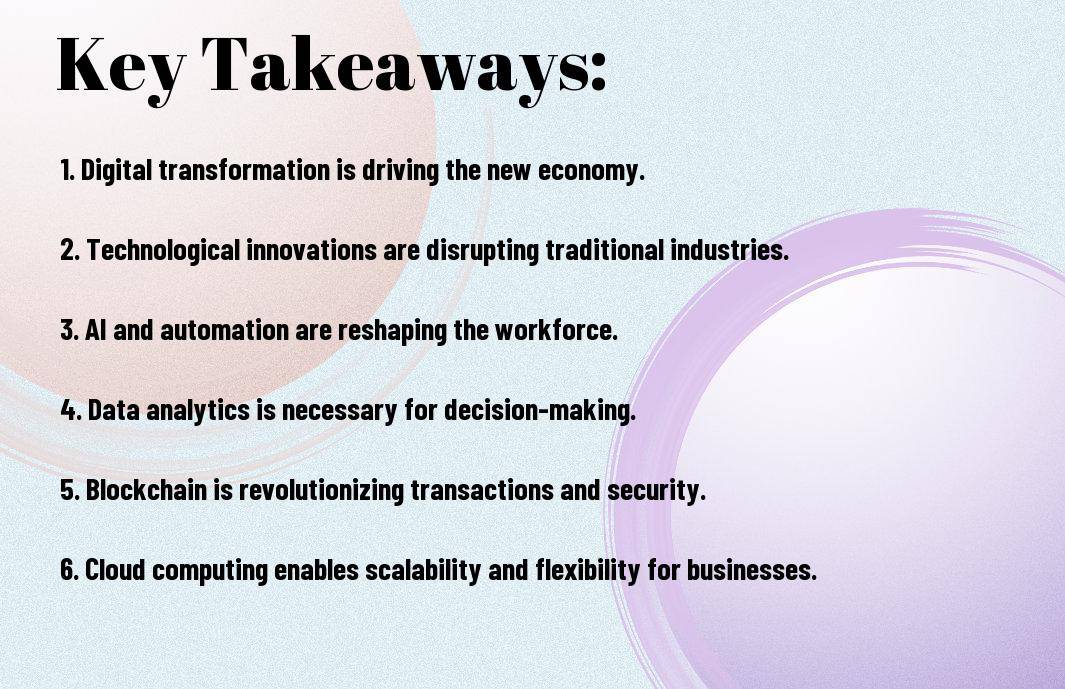
Newsletter Subscribe
Enter your email address below and subscribe to our newsletter

Enter your email address below and subscribe to our newsletter

Innovation in the field of technology has paved the way for a New Economy that is driven by technological advancements. The integration of artificial intelligence, automation, and big data has revolutionized industries and transformed the way businesses operate.
This shift has brought about unprecedented opportunities for growth and efficiency, but also poses challenges such as displacement of jobs and privacy concerns. Understanding the implications of these technological innovations is crucial for navigating the New Economy successfully. Stay tuned as we investigate deeper into the impact of technological advancements on the economy and society.



Now, as we investigate into the foundations of the new economy, it is crucial to understand the fundamental shifts that are reshaping the way we do business and interact with technology. The new economy is characterized by digital transformation, rapid technological advancements, and the rise of the information age. These factors have paved the way for a more interconnected and globalized marketplace where innovation and adaptability are key drivers of success.
Definition: The new economy refers to a modern economic system that is driven by technology, innovation, and knowledge-based industries. Key characteristics of the new economy include a strong emphasis on information and communication technologies, a focus on service-oriented industries, and an increased reliance on data and analytics to drive decision-making processes.
For many decades, industrial economies dominated the global landscape, relying on traditional manufacturing and production processes. However, with the advent of the information age, there has been a significant shift towards information-based economies, where intangible assets such as intellectual property, software, and data hold immense value. This transition has revolutionized the way businesses operate, leading to the rise of new industries such as fintech, e-commerce, and digital marketing.
Understanding the shift from industrial to information-based economies is crucial for businesses and policymakers to stay competitive in the rapidly evolving landscape. This transition presents both opportunities and challenges, as businesses need to adapt to changing consumer preferences, technological disruptions, and global market dynamics to thrive in the new economy.
For decades now, the Internet has been a driving force behind economic transformation worldwide. The ability to connect people, businesses, and devices instantaneously has revolutionized how we conduct business, share information, and interact with one another. With the rise of e-commerce, social media, and digital marketing, the Internet has created new opportunities for commerce and communication that were unimaginable just a few decades ago.
Economy Artificial intelligence (AI) and machine learning are two of the most powerful technological innovations shaping the new economy. These technologies enable computers to perform tasks that typically require human intelligence, such as visual perception, speech recognition, decision-making, and language translation. They are already being used in a wide array of industries, from finance and healthcare to transportation and manufacturing, to increase efficiency, improve accuracy, and drive innovation.
Technological AI and machine learning have the potential to significantly impact the workforce by automating routine tasks and augmenting human capabilities. While this may lead to concerns about job displacement, it also opens up new opportunities for higher-skilled, more fulfilling work.
Major Blockchain and cryptocurrencies have emerged as disruptive technologies with the potential to revolutionize the way we conduct financial transactions, secure data, and establish trust in a decentralized manner. Blockchain, the underlying technology behind cryptocurrencies like Bitcoin and Ethereum, is a distributed ledger that enables secure, transparent, and tamper-proof record-keeping.
A Cryptocurrencies growing number of industries, including banking, real estate, supply chain management, and healthcare, are exploring the benefits of blockchain technology for streamlining operations, reducing costs, and enhancing security.
Cryptocurrencies Automation and robotics are reshaping the economy by automating tasks traditionally performed by humans. From autonomous vehicles and robotic assembly lines to chatbots and virtual assistants, these technologies are increasing efficiency, reducing errors, and transforming the nature of work in various industries.
Blockchain While automation and robotics have the potential to improve productivity and lower costs, they also raise concerns about potential job displacement and the need for workers to acquire new skills to remain competitive in the workforce.
Technological As the world grapples with the challenges of climate change and resource depletion, technological innovations in renewable energy and sustainability are becoming increasingly important. From solar panels and wind turbines to energy-efficient buildings and smart grids, these technologies are revolutionizing how we generate, store, and consume energy in a more sustainable manner.
Artificial Advancements in renewable energy and sustainability technologies not only reduce our carbon footprint, but they also create new economic opportunities, drive innovation, and contribute to a cleaner, more sustainable future for generations to come.
Unlike the past, where manual labor dominated the manufacturing sector, Innovation and New Technology for Enabling Economic … have revolutionized the industry. Automation, artificial intelligence, and the Internet of Things have drastically changed the way goods are produced. These advancements have not only increased efficiency but also enhanced the quality of products being manufactured. The adoption of smart technologies has improved supply chain management, inventory control, and overall operational processes in the manufacturing sector.
For different organizations in the financial services sector, embracing technological innovations has been crucial in staying competitive and relevant in the digital age. For instance, the rise of fintech companies has disrupted traditional banking practices, offering customers more convenient and efficient ways to manage their finances. The implementation of blockchain technology has revolutionized the security and transparency of financial transactions, impacting how payments and remittances are processed.
Industry leaders in the healthcare sector are witnessing a transformation like never before, thanks to technological advancements. Electronic health records, telemedicine, and wearable health devices are just a few examples of innovations that have improved patient care and treatment outcomes. These digital solutions have not only streamlined medical procedures but have also empowered patients to take control of their health through easy access to information and services.
Sectors involved in agriculture have seen a significant transformation due to technological advancements. The integration of precision agriculture techniques, drones for monitoring crop health, and the use of data analytics have revolutionized farming practices. Financial investment in agritech has paved the way for sustainable farming methods, addressing food security challenges and improving crop yields.

Not long ago, the idea of buying goods and services online seemed like a distant possibility. However, with the rapid advancement of technology and the internet, e-commerce has become an integral part of the new digital marketplace. According to Technology and the future of growth: Challenges of change, the digital marketplace continues to evolve, presenting both opportunities and challenges for businesses in the global economy.
An imperative aspect of the digital marketplace is the evolution of online shopping. With the convenience of making purchases from the comfort of one’s own home, consumers are increasingly turning to e-commerce platforms for their shopping needs. The shift towards online shopping has not only changed consumer behavior but has also forced businesses to adapt to the growing trend by optimizing their online presence and customer experience.
Shopping online generates vast amounts of data related to consumer behavior, preferences, and trends. This data is where the role of big data and analytics in e-commerce becomes crucial. By leveraging advanced analytics tools, businesses can gain valuable insights into customer behavior, personalize their marketing strategies, optimize their product offerings, and ultimately enhance the overall shopping experience for their customers.
This data-driven approach not only helps businesses better understand their target audience but also enables them to make informed decisions that drive growth and profitability in the highly competitive e-commerce landscape.
The future of e-commerce is filled with exciting possibilities. Advancements in technology such as augmented reality, artificial intelligence, and voice commerce are reshaping the way consumers interact with online stores. Businesses that embrace these technological innovations and adapt to changing consumer preferences will have a competitive edge in the digital marketplace. Additionally, the rise of mobile shopping and the integration of social media platforms into e-commerce are expected to further revolutionize the online shopping experience.
Plus, the continued emphasis on cybersecurity and data privacy will be paramount as the e-commerce landscape expands. Ensuring the security of online transactions and safeguarding customer data will be crucial for building and maintaining trust with consumers. By staying ahead of these trends and challenges, businesses can position themselves for success in the dynamic world of e-commerce.
To address the challenges in the new economy, it is crucial to consider the ethical implications of technological innovations. According to Technology and the Innovation Economy, advancements in technology bring about ethical dilemmas that must be carefully navigated. The rapid pace of innovation can sometimes outstrip our ability to fully understand the ethical ramifications of new technologies. It is crucial to proactively identify and address ethical issues to ensure that technology is being used responsibly and in the best interest of society.
Any discussion about challenges in the new economy must include a focus on data security and privacy issues. The exponential increase in data collection and utilization has raised concerns about the protection of sensitive information. Any organization that collects data must prioritize the security and privacy of that data to prevent breaches and unauthorized access. Safeguarding data is not only a legal requirement but also a trust-building measure with customers and stakeholders.
Security measures such as encryption, access controls, and regular security audits are crucial for maintaining the integrity of data. Organizations must also stay informed about the latest data security threats and continuously update their security protocols to stay ahead of potential risks.
Security concerns also extend to the digital divide, which refers to the gap between those who have access to technology and those who do not. Bridging this gap is crucial to ensure that everyone has equal opportunities to benefit from the new economy. Initiatives to address the digital divide may include improving infrastructure in underserved areas, providing affordable access to technology, and offering digital literacy programs to enhance technological skills.
Data shows that addressing the digital divide not only promotes economic equality but also fosters innovation and workforce development. By ensuring that all members of society have access to the tools and resources needed to thrive in the digital age, we can create a more inclusive and prosperous economy for all.
An understanding of the impact on employment and workforce adaptation is crucial in navigating the challenges of the new economy. Workforce must be prepared to adapt to changing job requirements and skill sets brought about by technological advancements. Automation and artificial intelligence are reshaping industries and job roles, making it crucial for workers to upskill and reskill to remain competitive in the job market.
Once again, it is vital to acknowledge the crucial role that governments play in shaping the technological landscape through policies and regulations. Government policies can incentivize innovation, promote competition, and ensure consumer protection in the rapidly evolving technological sector. By enacting laws that foster a conducive environment for technological advancements, governments can drive economic growth and societal progress.
With the rapid evolution of technologies such as artificial intelligence, blockchain, and biotechnology, regulatory challenges arise in ensuring ethical use, data privacy, and cybersecurity. Regulatory frameworks must adapt swiftly to keep pace with technological advancements to protect citizens and promote responsible innovation. Striking a balance between fostering innovation and safeguarding the public interest is important for a sustainable technological economy.
Another significant challenge in regulating a rapidly evolving economy is the global nature of technology companies and platforms. As these companies operate across borders, ensuring compliance with diverse regulatory environments becomes increasingly complex. International collaboration and the establishment of harmonized standards are key to addressing these challenges and creating a level playing field for all stakeholders.
Regulatory bodies and stakeholders must collaborate internationally to establish common standards that facilitate interoperability and regulatory compliance across jurisdictions. Global cooperation can help prevent regulatory arbitrage and ensure that technological advancements benefit societies worldwide. By harmonizing regulations and standards, countries can promote innovation while upholding ethical principles and protecting the interests of their citizens.
The development of international frameworks for emerging technologies like autonomous vehicles and quantum computing requires coordinated efforts from governments, industry leaders, and experts. These collaborative initiatives can promote innovation, drive economic growth, and address global challenges in a rapidly evolving technological landscape.
After witnessing the rapid advancements in technology and the evolution of the economy, it is crucial for individuals and organizations to prepare for the future. This preparation involves acquiring new skills, fostering innovation, and anticipating upcoming technological breakthroughs.
Preparing for the future economy requires a shift in the way we approach education and skills development. With automation and artificial intelligence reshaping industries, individuals need to focus on acquiring skills that are resilient to technological advancements. Emphasis should be placed on digital literacy, critical thinking, problem-solving, and adaptability. Continuous learning and upskilling will be imperative to thrive in the new economy.
Skills in innovation and entrepreneurship will be paramount in the future economy. Organizations and individuals need to foster a culture that encourages creativity, risk-taking, and problem-solving. Collaboration across disciplines and the ability to adapt to change will drive innovation forward. Entrepreneurial skills such as idea generation, market analysis, and business acumen will be key for individuals looking to seize opportunities in the evolving economy.
The ability to leverage technology and adapt to changing market dynamics will be crucial for staying competitive in the future economy. Entrepreneurs who can identify gaps in the market and develop solutions that align with emerging trends will be well-positioned for success.
Anticipating future technological breakthroughs is imperative for staying ahead in the ever-evolving technological landscape. Keeping abreast of emerging technologies such as artificial intelligence, quantum computing, and biotechnology can provide insights into potential disruptions and opportunities. Organizations that invest in research and development to anticipate technological advancements will be better equipped to innovate and adapt to changing market demands.
By proactively monitoring trends and engaging with industry experts, businesses can position themselves as leaders in their respective fields and capitalize on breakthrough technologies before their competitors. The ability to anticipate and leverage future technological developments will be a key differentiator in the new economy.
Considering all points discussed, it is clear that the new economy is heavily reliant on technological innovations. These innovations have transformed the way businesses operate, allowing for increased efficiency, new markets, and greater levels of connectivity. From automation to blockchain technology, businesses are constantly adapting to stay competitive in this fast-paced environment.
As we move further into the digital age, it is crucial for organizations to embrace these technological advancements and incorporate them into their business strategies. By doing so, companies can better position themselves for success in the ever-evolving new economy. It is undeniable that technological innovations will continue to shape the future of business, making it vital for individuals and organizations alike to stay informed and adapt to the changing landscape of the new economy.
A: The new economy refers to an economic model characterized by the use of technology, innovation, and digital platforms to drive growth and efficiency.
A: Technological innovations are new or improved processes, products, or services that are developed through research and technology to solve problems or meet new needs.
A: Technological innovations drive the new economy by enabling businesses to streamline operations, reach new markets, and create innovative products and services that cater to changing consumer demands.
A: Examples of technological innovations in the new economy include artificial intelligence, blockchain technology, 3D printing, Internet of Things (IoT), and virtual reality.
A: Small businesses benefit from technological innovations in the new economy by gaining access to affordable digital tools that can help them improve efficiency, reach larger audiences, and compete with larger corporations.
A: Challenges associated with the adoption of technological innovations in the new economy include cybersecurity risks, job displacement due to automation, and the need for continuous upskilling of the workforce to keep up with technological advancements.
A: Individuals can prepare for the changes brought about by the new economy and technological innovations by investing in continuous learning, acquiring new skills relevant to emerging technologies, and staying informed about industry trends and job market demands.